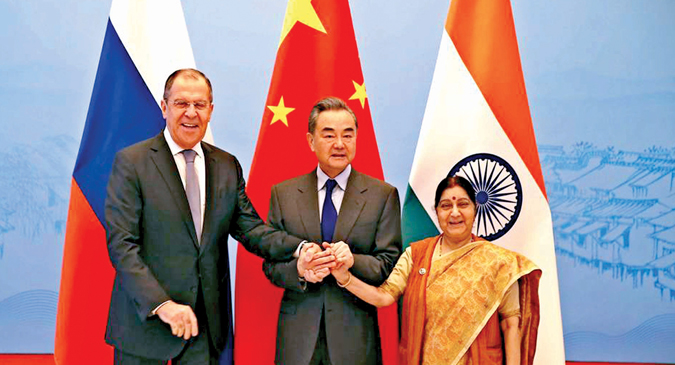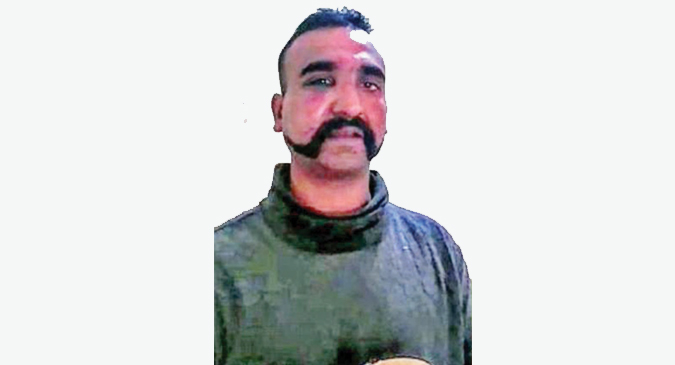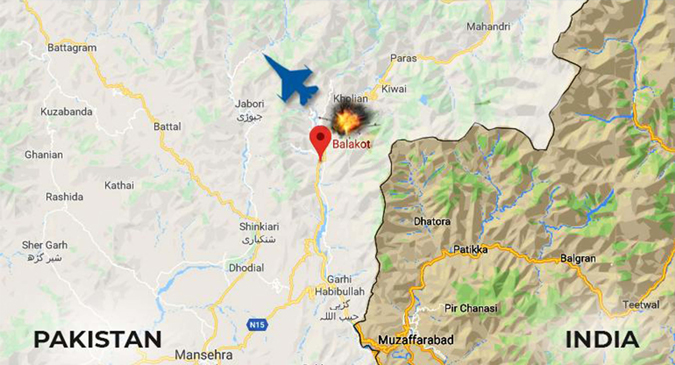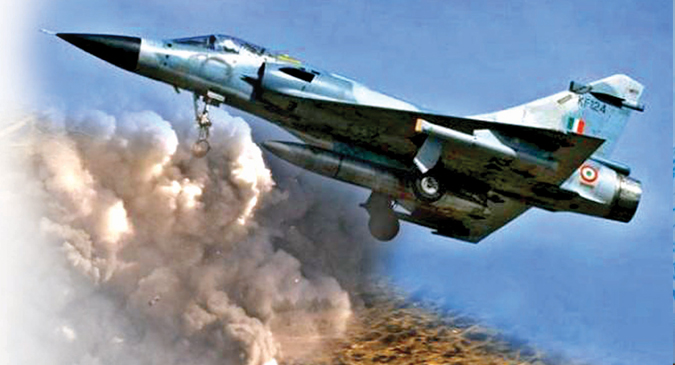Narendra Modi’s international stature is paying off well in dealing with Pakistan as a semi-rogue state
After Pulwama, the diplomatic ground for a punishing Indian response was well-prepared by India. Prime Minister Narendra Modi deserves applause for changing the matrix of our response to Pakistani sponsored terror attacks against us. That the United States National Security (UNSC) Adviser John Bolton acknowledged India’s right to self-defence was a shot in our diplomatic arm. It sent a clear message to Pakistan that the US would not object to military action by India against it. France has been squarely on our side. The statement by the UN Security Council strongly condemning the Pulwama attack and identifying JeM as responsible for it was unprecedented in so far as the position of the UNSC on Kashmir is concerned. If the terrorist attack had taken place outside J&K, it would have been easier for the UNSC to castigate it severely.

(From Left) Russian Foreign Minister Sergei Lavrov, Chinese Foreign Minister Wang Yi and Indian External Affairs Minister Sushma Swaraj at Wuzhen in China on February 27, 2019
That it happened in Kashmir, and a statement was issued without bringing in extraneous issues as a peaceful resolution of the Kashmir problem, human rights and exhortation to the two sides to engage each other in a dialogue etc shows how much international opinion on the Kashmir issue has changed, how much Pakistan’s case has lost international traction and how much Pakistan’s terrorist affiliations have damaged the political standing of the country. That China was forced to accept the text of the statement that mentioned JeM also shows how much China has had to come to terms with the strong support for India in the UNSC and pressure on it not to be isolated and be projected as supporting Pakistan on the terrorism issue. Equally importantly, India obtained strong support from the UAE and Saudi Arabia on Pulwama despite the attack having occurred in Kashmir and Pakistan being held responsible by us. Instead of striking middle ground, both these countries backed India on the issue of terrorism. The Prime Minister has personally made great effort to build strong bridges with these two conservative Islamic countries. It is remarkable how the perception that the Prime Minister and the BJP are “anti-Muslim” has not weighed with these two Gulf monarchies and how they look at India pragmatically in terms of their national interest rather than the religious angle that Pakistan has historically exploited to drive a wedge between India and the Islamic world.

Wing Commander Abhinandan Varthaman, who shot down Pakistan’s intruding F-16 fighter jet but was held captive after the crash of his MiG 21
Diplomatic support is one thing but taking a bold decision to take military action against Pakistan is another. Previous governments have been reluctant to make Pakistan pay a real price for its sponsorship of terror. We took no military action even after the enormity of the Mumbai terror attack (9/11) and resumed dialogue with Pakistan after eight months. After the attack on Uri by Pakistan-based terrorist group, India gave a warning to Pakistan by conducting surgical strikes across the LoC in 2016. It was a clear message that India will no longer treat the LoC as sacrosanct and would be willing to hit at Pakistan in response to its terror attacks.

The Daring Air Strikes
The 5 Mirage 2000s were backed up by more fighter aircraft of the same kind, along with a number of Sukhoi Su-30 MKIs, a mid-air refueller and two Airborne Warning and Control System (AWACS). The strike began at 3:45 am and lasted 21 minutes.
3:30am : Indian Air Force (IAF) Jets Take Off
3:30am : Mirage Fighters Take Off From Different Air Bases
3:35am : IAF Jets Cross LoC
3:45am : Balakot JeM camp Hit and Multiple 1000kg Bombs Dropped
Pakistan has not heeded that warning as Pulwama has shown. This time Prime Minister gave the green light to the armed forces to hit at Pakistan at a time and place and methodology of their choosing. Hitting at Balakot, which is outside PoJK and inside mainland Pakistan, was a major step. The destruction of the main training camp of the JeM through use of air power has demonstrated our capabilities and the political courage of the Prime Minister. He has focused on national interest and has shown his willingness to take the risk so close to our national elections. In such matters, things can always go wrong or not proceed as expected, but this has not deterred the Prime Minister.

Wreckage of Pakistani Air Force F-16 shot down by IAF MiG-21 spotted in PoJK
That India’s diplomatic standing in the world has risen under Narendra Modi more than ever before is evident from the international reaction after our aerial strikes. There is no criticism or condemnation by any country of India’s action. On the contrary, France, the US and the UK will be raising the issue of designating JeM chief Masood Azhar as an international terrorist by the UNSC’s 1267 committee. At the Russia-India-China Foreign Minister level dialogue in China India raised the issue of Pakistan’s involvement in terrorism forcefully and obtained a strong statement on terrorism and the responsibilities of the States to eliminate it. The Ministry of External Affairs has been active in briefing foreign envoys in New Delhi on our air strikes, and the External Affairs Minister has spoken to key counterparts. It is normal for US, UK and others to call for de-escalation and restraint and dialogue because of concerns that India and Pakistan are nuclear powers and things should not deteriorate to the point that the spectre of nuclear exchanges arises.

- Prime Minister Shri narendra Modi is right in saying that he will protect the country and will not let the country bow its head. This is the kind of leadership that India has needed for a long time
- There is no criticism or condemnation by any country of India’s action. On the contrary, France, the US and the UK will be raising the issue of designating JeM chief Masood Azhar as an international terrorist by the UNSC’s 1267 committee
Along with calls for de-escalation, Pakistan has been summoned by countries like the US, France and Australia to deal urgently with terror organisations on its soil. Ultimately, it is for us to decide what we have to do, irrespective of the position of other countries. India has no intention to escalate unnecessarily. The onus for escalation is on Pakistan. If Pakistan is foolish to up the ante, international opinion will be on our side as we have shown a great deal of maturity in handling our air strikes, calling the non-military and pre-emptive, an intelligence-led operation to hit at a known terrorist training camp where suicide car bombers were being trained to carry out attacks on Indian cities. Pakistan was given an escape route which foolishly it has not taken.
Pakistan is in a precarious financial situation and needs a bailout by the IMF and others. It cannot afford to have a real confrontation with India. The fact that one of our pilots is in its custody does not give it any bargaining chip. That our Mig 21 could shoot down their F16 aircraft shows how vulnerable Pakistan is should it seek to engage India militarily. India has rightly made it known that it will not bargain with Pakistan over the pilot and will strike back hard if Pakistan challenges India. Prime Minister Modi is right in saying that he will protect the country and will not let the country bow its head. This is the kind of leadership that India has needed for a long time. Modi’s international stature is paying off well in dealing with Pakistan as a semi-rogue state.
(The writer is fomer Foreign Secretary, Government of India)














Comments